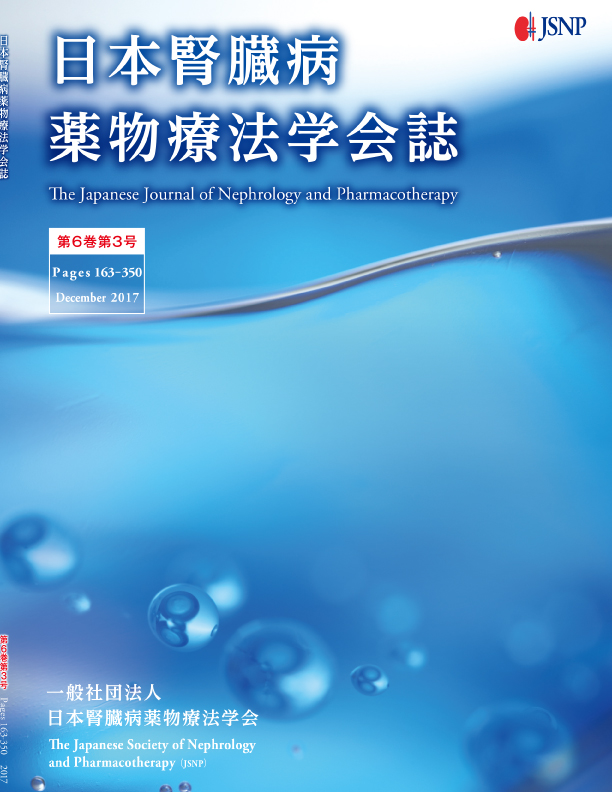
- Issue 3 Pages 377-
- Issue 2 Pages 185-
- Issue 1 Pages 3-
- |<
- <
- 1
- >
- >|
-
Kotaro Hitoshi, Akio Tanaka, Yoshinari Yasuda2024 Volume 13 Issue 1 Pages 3-12
Published: 2024
Released on J-STAGE: April 07, 2024
JOURNAL FREE ACCESSTo avoid the risk of AKI in patients with CKD and patients with heart failure who continue using renin-angiotensin-aldosterone system (RAAS) inhibitors, diuretics, or non-steroidal anti-inflammatory drugs (NSAIDs), it has been suggested that on sick days (when dehydration is suspected due to fever, diarrhea, or vomiting), patients should consider a temporary withdrawal or dose reduction of renally excreted drugs or nephrotoxic drugs, commonly described as “sick day rules.” In June 2023, Japanese guidelines specifically indicated the sick day rule for CKD patients and identified the medications that should be temporarily withdrawn on sick days. Therefore, the practice of patient education based on the sick day rule is expected to expand in the future. Meanwhile, reports on the initiative toward clinical application of the sick day rule in CKD patients have begun to appear overseas since 2016. This review summarizes these past reports by year and theme, introduces the contents, and discusses the problems of each approach as: 1) Research on creation and clinical application of CKD sick day rules; 2) Research on CKD sick day rule practice and patient education; and 3) Intervention research on CKD sick day guidance. Although sick day guidance has been in practice for patients with AKI risk in many countries, based on guidelines and expert opinions, there is no research that has clarified the usefulness of such guidance presently. This is primarily due to the ambiguity of the sick day rule and lack of education and collaboration among healthcare professionals and patients. Based on the results of previous studies, the following issues have been raised towards the clinical application of the CKD sick day rule: 1) Selection of patients to whom the sick day rule should be applied; 2) Strengthening collaboration among healthcare professions and clarifying their roles; 3) Implementing education based on patient understanding; and 4) Follow-up after imparting education.
View full abstractDownload PDF (1430K)
-
Mizuho Miyake, Taku Furukubo, Takuya Yoshida, Rie Tanaka, Tomoko Oda, ...2024 Volume 13 Issue 1 Pages 13-21
Published: 2024
Released on J-STAGE: April 07, 2024
JOURNAL FREE ACCESSRemdesivir (RDV) is currently not recommended for patients with severe renal impairment due to safety concerns. However, several studies have shown that it can be administered to dialysis patients without particular considerations.
In this study, we evaluated the feasibility of using RDV at standard doses by investigating the occurrence of serious adverse events during the treatment period.
We included 164 dialysis patients treated with RDV. The average age of the patient group was 72 [29-97], 113 (68.9%) were male and 22 were not vaccinated against SARS-CoV-2 (13.4%). The included patients were suffering from mild to moderate severity COVID-19 upon hospital admission, from May 2021 to November 2022. RDV was administered at 100 mg daily following a 200 mg loading dose on the first day (post-dialysis on dialysis days). We monitored the occurrence of hypersensitivity reactions and liver dysfunction throughout the treatment period.
None of the patients experienced a worsening of their COVID-19 severity within 10 days of treatment. Hypersensitivity reactions were observed in 12 patients (7.3%), with 8 patients exhibiting symptoms at the first dose. One patient developed a skin rash, resulting in the discontinuation of RDV. Abnormal injection site reactions occurred in seven patients but did not necessitate treatment discontinuation. Suspected abnormal liver function tests were observed in 8 patients, but no additional treatment was required. One patient discontinued RDV due to an elevation of PT-INR on day 3 of treatment.
This study demonstrates that dialysis patients can receive RDV at a standard dosage regimen. However, monitoring for hypersensitivity reactions and liver function, as with normal subjects, is required.
View full abstractDownload PDF (845K)
- |<
- <
- 1
- >
- >|